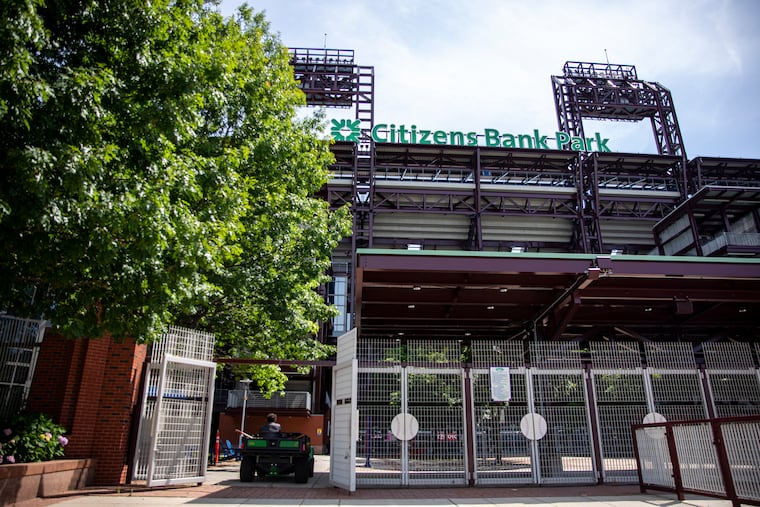With layoffs, the Phillies betrayed loyal employees and David Montgomery’s legacy | Mike Sielski
The team laid off four longtime employees this week, a sign that the Phils don't operate anymore the way they once did.

Within every major American sports franchise, there are two major American sports franchises.
There is the franchise made up of the people who occupy most, if not all, of the public’s attention and interest: the athletes, the coaches, the executives, the people on the field or the court or the rink, the people who put them there. Theirs is a cutthroat business, and everyone engaged in or following that business knows it. Players can and will be traded or cut or waived or forced to retire. They will hold out for more money. Coaches and managers can and will be fired. This is the nature of this territory, and those who are part of it understand what comes with it.
But there is also the franchise made up of the people who keep the organization running smoothly, who make it go during the day-to-day, while having little to no impact on the team’s place in the standings. This is not to say that these people aren’t important. They are essential, and they are often the longest-tenured employees in the entire organization. They process your ticket orders. They arrange interviews with players. They open the video room for the starting quarterback or the lineup’s best hitter and keep it open as long as he wants. They are lifers, and they are glad to be.
The Phillies laid off four such employees this week: director of baseball communications Greg Casterioto, director of video coaching Kevin Camiscioli, director of minor-league operations Steve Noworyta, and strength and conditioning coordinator Paul Fournier. Each of them had spent at least a decade with the organization. Casterioto, Camiscioli, and Noworyta had spent at least two.
These layoffs weren’t precipitated by the pandemic, by any malevolent economic forces beyond the organization’s control. Dave Dombrowski, the team’s president of baseball operations, and Sam Fuld, its general manager, simply wanted new people in those positions. These changes won’t keep Bryce Harper from going 0-for-11 in a critical series against the Braves again, or Aaron Nola from posting a plus-6 ERA next September, or the Phillies bullpen from embarking on another six-month pyromania tour. They were not intended to. Dombrowski and Fuld wanted these four gone and deemed them dispensable, so they are gone.
At another time in their history – during David Montgomery’s 22-year tenure as their president and chairman, for instance, from 1997 until his death from cancer in 2019 – the Phillies wouldn’t have done something so cold and ruthless. Say what you want about the quality of the teams that they fielded for many of those years. Those things have been said already, including by me. The loyalty and sentimentality that Montgomery prized so much bled into the team’s player-personnel decisions, led to an insistence on committing to and holding on to beloved superstar players who were about to be past their prime or were already, and there’s an argument to be made that the Phillies, from a baseball standpoint, are still paying the price for those decisions today.
There was ample cause to question and criticize that Phillies franchise, but rarely the other Phillies franchise: the Phillies as a city and community institution, a place where people wanted to work for a long time and could, a place where loyalty and good work were appreciated and rewarded and returned. There was a reason. Montgomery had started with the Phillies in 1971, as a sales apprentice. He was a lifer, too.
In March 2018, just 14 months before Montgomery’s death, the Phillies held a ceremony in Clearwater to rename their indoor training facility there after him. One lengthy excerpt from his remarks that day is worth quoting in full here because it so clearly speaks to who Montgomery was and how the Phillies operated for so long.
“It was special that the whole organization was here because, as you know, that’s what I believe in,” he said then. “I believe that in whatever capacity you work for us, you determine the Phillies family. I believe that. As a family member, it’s our responsibility to treat you like family and to get to know you as best we can. That’s something I’ve always believed in.
“My business philosophy is pretty simple. We’re in a service business, and we’re trying to do everything we can to attract fans and treat fans right. The best way to treat fans right is to treat the people you work with right. I don’t touch fans, but so many people who work for us touch fans directly every day, and if they feel that we – the organization, the ownership, the management – care about them as people, then in my mind, that’s the best way for those fans to be treated well.
“I’m proud when I’m in Philadelphia and game day staff come up to me and say how much they enjoy working for the Phillies, because that means that whoever they are serving a beverage to or serving a hot dog to or if they’re acting as a host or hostess or security guard, then they’re going the extra mile because they care about the organization.”
This isn’t David Montgomery’s franchise anymore, in any regard. It’s to the Phillies’ discredit that it isn’t.